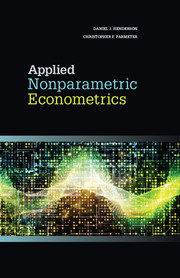Book contents
- Frontmatter
- Dedication
- Contents
- 1 Introduction
- 2 Univariate density estimation
- 3 Multivariate density estimation
- 4 Inference about the density
- 5 Regression
- 6 Testing in regression
- 7 Smoothing discrete variables
- 8 Regression with discrete covariates
- 9 Semiparametric methods
- 10 Instrumental variables
- 11 Panel data
- 12 Constrained estimation and inference
- Bibliography
- Index
8 - Regression with discrete covariates
Published online by Cambridge University Press: 05 February 2015
- Frontmatter
- Dedication
- Contents
- 1 Introduction
- 2 Univariate density estimation
- 3 Multivariate density estimation
- 4 Inference about the density
- 5 Regression
- 6 Testing in regression
- 7 Smoothing discrete variables
- 8 Regression with discrete covariates
- 9 Semiparametric methods
- 10 Instrumental variables
- 11 Panel data
- 12 Constrained estimation and inference
- Bibliography
- Index
Summary
In this chapter, we outline how to construct nonparametric estimators for a regression model in the presence of discrete regressors. Estimating a regression model when either all of the covariates are discrete or there is mixed data is relatively straightforward, given our earlier discussion in Chapter 5. The key is that we must use kernels appropriate for smoothing discrete data, as discussed in Chapter 7. As with density estimation we will need to modify the kernel weights. Aside from this modification from the continuous-only setting, the intuition and construction of the estimators follow. We feel that you will have little trouble following the arguments in this chapter (assuming you understand the previous chapters). We leave our treatment of estimation with a discrete left-hand-side variable for the presentation of semiparametric methods (Chapter 9).
After discussing estimation, we focus on derivative estimation. Estimating derivatives for the continuous regressors (when discrete regressors are present) proceeds exactly as in the continuous-variable-only setting. What requires more care is obtaining the “derivatives” for the discrete variables, but this should be expected. We use the term “derivative” loosely given that it is clear our conditional mean estimator is no longer continuous in the discrete variables. Similar to the case for a discrete regressor in a parametric model, we obtain our partial effect as the difference between the conditional mean evaluated at one value for the discrete regressor minus value of the discrete regressor, holding everything else constant.
As in all nonparametric estimation, bandwidth selection is of primary importance. We discuss how to select the bandwidths for our discrete variables. The methodology is essentially the same as that in Chapter 5. After selecting our bandwidths and running regressions, we subject our models to formal statistical tests. Here we examine tests that are designed specifically for discrete data. We start with a test for correct parametric specification and also examine tests for variable relevance in the presence of discrete regressors.
- Type
- Chapter
- Information
- Applied Nonparametric Econometrics , pp. 205 - 226Publisher: Cambridge University PressPrint publication year: 2015



